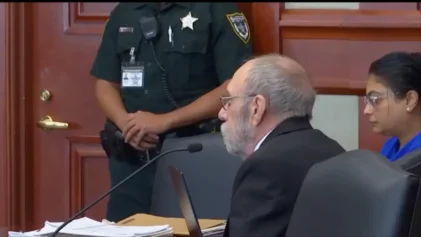A retired Detroit public school worker is suing one of Livonia’s bank branches for racial discrimination. The African-American woman alleges white tellers believed her check was fake because of her race.
On Monday, Aug. 29, Lizzie Pugh, 71, filed a federal lawsuit in the U.S. District Court for the Eastern District of Michigan against Fifth Third Bank, National Association, Fifth Third Financial Corporation and Old Kent Mortgage Services, Inc. after employees refused to cash and deposit a five-figure check she received after striking it big with the jackpot slot machines at the Soaring Eagle Casino & Resort in Mt. Pleasant, Michigan, according to the Detroit Free Press.
Pugh, a deacon at her church, had gone to the casino with her church on Saturday, April 9, and was shocked when told at the bank by three white workers that her check was fraudulent, and they would not be giving it back to her.
According to the lawsuit, after hitting the jackpot, Pugh decided to pay the taxes on her winnings at the casino. In return, the casino issued her a check for a large portion of her winnings. The rest of the cash, a very small portion, was given to her in cash.
The complaint does not list how much Pugh won or the amount of the check.
Pugh took the check to the bank two days after the church outing, with the hopes of opening a savings account. But those dreams were halted after a bank employee called her into her office to question her about the check.
As the faith leader explained herself to the worker, she was asked for her license and details about her employment. Pugh shared she was retired, and the check came from Soaring Eagle Casino. The check included the casino’s logo, its address, and in the memo line: “SLOT JACKPOT.” It also included Pugh’s name and address, as reflected on her ID.
This was not enough for the employee; she had the thought that something was wrong.
“She left the room. She came back and she told me that the check was fraudulent, and she could not give it back to me,” Pugh said. “I’m like, ‘Why? It’s not fraudulent.’ “
The senior, who worked for the Detroit public school district for 36 years, said, “I couldn’t really believe they did that to me. I was devastated.”
Pugh says she continued to ask the bankers, “ ‘How do you know the check is not real?’ They just insisted that it was fraudulent … I was just terrified.”
Despite being afraid and humiliated, Pugh says she did not leave. Instead, she waited to clear her name.
“To think that maybe they would have police coming and running at me — it was humiliating and stressful,” Pugh recalled. “For someone to just accuse you of stealing? I’m 71 years old. Why would I steal a check and try to cash it? I just didn’t think anybody would do that.”
Eventually, a second employee came over and co-signed on the decision by her colleague, and again refused to return the check.
Pugh says she then called her son, saying, “I’m not leaving without the check.”
She added, “I told them I wasn’t leaving. You need to call the police. Or better yet, I’ll call myself.”
Instead of calling the police, the bankers called another colleague to assess the check. The third bank employee also called the check fake.
Still, Pugh, despite being frightened, refused to leave. Eventually, the bank decided to give her the check back. With her check, she walked out into the parking lot and got her nerves together before she left.
“I was really, really nervous,” Pugh recalled of those first few moments back in her car in the bank parking lot. “I had to sit there for a minute. I took a picture of the bank. I had no idea what the address was or anything like that. And then I left.”
Even though Fifth Third did not accept the check, Chase bank not far from the bank did — with no problem.
Pugh shared the ordeal with her niece, Yolanda McGee, who insisted she file a lawsuit.
“I told her, ‘This clearly was a violation of your civil rights,” said McGee. “There are laws in place now, where you can fight. Let’s fight this.’ ”
She remembered telling her aunt, “Fifth Third Bank needs to know that they humiliated you. What they did was wrong. And they need to answer for this. I encouraged her. I said, ‘no, no, no, no, no. We are not in 1950s Alabama. We’re not in the Jim Crow era. We are gonna fight,’ ” she said. “ ‘No one’s gonna shame you.’ ”
McGee helped her aunt secure Deborah Gordon, a civil rights attorney, proficient in working discrimination lawsuits involving “Banking while Black.”
According to The New York Times, being racially profiled is not uncommon when #BankingwhileBlack, with the newspaper revealing that under federal laws banks are rarely reprimanded for their actions.
The article stated, “Something as simple as trying to cash a check or open a bank account can lead to suspicious employees summoning the police, causing anxiety and fear — and sometimes even physical danger — for the accused customers.”
“There is no data on how frequently the police are called on customers who are making legitimate everyday transactions,” the article continued, adding, “Most people who experience an episode of racial profiling don’t report it … Some find it easier to engage in private settlement negotiations.”
This would have been Pugh’s inclination. Had it not been for her niece, she would not have pursued litigation.
“What happened to Lizzie was really a heartbreaking situation,” Gordon stated. “Given what she has lived through — and to have a happy moment, something she enjoyed, be ruined by being humiliated?”
She continued, “This is just extremely disheartening. It’s really unfortunate these stereotypes continue to exist right here in our metro area.”
Now she hopes to find justice in a courtroom. The Hon. Sean F. Cox will be the presiding judge on the case, and Pugh is requesting a trial by jury.
Fifth Third Bank has not responded publicly to the lawsuit.


